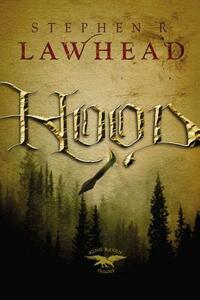Take a photo of a barcode or cover
I guess I am pretty biased -- I really love retellings/updates of British legends like Robin Hood and King Arthur. I enjoyed the Arthur series by Lawhead years ago, so, as expected, I also liked this version of Robin Hood. I didn't mind that he set it in Wales, it felt organic and true to the original tales. Robin is not quite a virtuous hero (at first) but the stirrings of one are in his heart. I'm definitely continuing with the series.
This book was a nice surprise. I was a little hesitant to pick it up because the story of Robin Hood has been ruined so many times. However, this story was a breath of fresh air on a stale and worn out tale.
One of the biggest reasons I couldn't give it a 5/5 stars was because I struggled too much with the pronunciation of some of the names and the use of some of the different languages. I know they often told you what the meaning of the word was right after the use (or you could deduce what the meaning was in it's context). However, it comes off more of showing the knowledge of another language than adding anything to the story.
That being said, I have 'Scarlet' sitting in front of me now and I can't wait to dig in.
One of the biggest reasons I couldn't give it a 5/5 stars was because I struggled too much with the pronunciation of some of the names and the use of some of the different languages. I know they often told you what the meaning of the word was right after the use (or you could deduce what the meaning was in it's context). However, it comes off more of showing the knowledge of another language than adding anything to the story.
That being said, I have 'Scarlet' sitting in front of me now and I can't wait to dig in.
This took like 300 pages to get anywhere, and it just felt a little slow and exhausting, I just really wanted more. Plus, I wasn't a huge fan of the Marian/Robin (or Bran ap Brychan and Merian) dynamic. Eh, not my favorite Robin Hood story.
I allow myself an exception in my normal reading cycle to read a whole series instead of breaking it up over multiple rounds. My wife has been a Stephen Lawhead fan for many years and has tried many times to get me to read him. I had always come across a struggle to find all of the books in a series on audiobook before and so this made it difficult. Recently, however, my library has added many of his books to their digital collection and so I checked out the complete King Raven Trilogy and finally gave him a chance. This review is of all three books in the series. I am pretty certain that I remember which parts came from which book, but there might be spoilers.
I enjoyed Hood quite a bit, but it was very slow. Lawhead seemed to give a lot of details and spend a descent amount of time focused on the details of daily life as part of setting the scene. However, it was an enjoyable retelling of the Robin Hood story and certainly a believable take on it. He explained at the end a minor bit of evidence that caused him to change the traditional setting and the story does fit well into the time period and the politics. Having read the full Wikipedia article on it in 2012, about the time my wife was reading Tuck the origins of the story are murky enough to make this take plausible. It also seems that the Russell Crowe version of Robin Hood borrowed minor things from this book. Once (view spoiler) the story and pace really picked up. The psychological and guerrilla warfare was very gripping to read. Honestly, it would have been OK if it ended there, even if it didn't cover the full legend.
However, the story continued in Scarlet and took an odd turn from there. It went from being third-person [limited I seem to recall] to first-person and followed Will Scarlet instead of Bran. The story again drug at times and we seemed to miss action that would have been included had the perspective been more inclusive, if nothing else, I felt a stronger connection to Bran than the new character. My only guess is that in addition wanting to tell the story from another perspective it helped Lawhead drag the story out into a trilogy and made it easier to develop the plot by hiding much of it away from the reader in other people's minds. The book wasn't bad, but no where near as good at the first in the series.
The story continued and concluded with Tuck. I seem to recall that this story had a mix of first and third person points of view, but either was it was better than the second in the series. The plot moved along nicely and the secrecy and subterfuge was very entertaining. It lacked the epic battle scene that so many versions of the Robin Hood, especially movie versions, seem to build up to, but part of this telling's charm is the unique take on the story and the retelling of it.
My wife has argued to me that this is one of her least favorite Lawhead books, just above his sci-fi novels. I remember her encouraging me to read it when it came out, but still I'll take her word on it. If that is the case then his others will probably be good, but I cannot say that I loved it or that I am eager to return to him as an author. Personally, I enjoyed it more because of the original take on the legend than for the writing itself.
I enjoyed Hood quite a bit, but it was very slow. Lawhead seemed to give a lot of details and spend a descent amount of time focused on the details of daily life as part of setting the scene. However, it was an enjoyable retelling of the Robin Hood story and certainly a believable take on it. He explained at the end a minor bit of evidence that caused him to change the traditional setting and the story does fit well into the time period and the politics. Having read the full Wikipedia article on it in 2012, about the time my wife was reading Tuck the origins of the story are murky enough to make this take plausible. It also seems that the Russell Crowe version of Robin Hood borrowed minor things from this book. Once (view spoiler) the story and pace really picked up. The psychological and guerrilla warfare was very gripping to read. Honestly, it would have been OK if it ended there, even if it didn't cover the full legend.
However, the story continued in Scarlet and took an odd turn from there. It went from being third-person [limited I seem to recall] to first-person and followed Will Scarlet instead of Bran. The story again drug at times and we seemed to miss action that would have been included had the perspective been more inclusive, if nothing else, I felt a stronger connection to Bran than the new character. My only guess is that in addition wanting to tell the story from another perspective it helped Lawhead drag the story out into a trilogy and made it easier to develop the plot by hiding much of it away from the reader in other people's minds. The book wasn't bad, but no where near as good at the first in the series.
The story continued and concluded with Tuck. I seem to recall that this story had a mix of first and third person points of view, but either was it was better than the second in the series. The plot moved along nicely and the secrecy and subterfuge was very entertaining. It lacked the epic battle scene that so many versions of the Robin Hood, especially movie versions, seem to build up to, but part of this telling's charm is the unique take on the story and the retelling of it.
My wife has argued to me that this is one of her least favorite Lawhead books, just above his sci-fi novels. I remember her encouraging me to read it when it came out, but still I'll take her word on it. If that is the case then his others will probably be good, but I cannot say that I loved it or that I am eager to return to him as an author. Personally, I enjoyed it more because of the original take on the legend than for the writing itself.
A rather well written book. It did have some long drawn out spells of just dialog or thoughts. Some of the back history was a bit tedious at times too. However, there was enough story to keep me wanting more. I enjoy his writting style and as a bit of a history buff the boring details did not bother me as much as some reviewers. Enough action to keep the pages turning. I agree with one reviewer that the time Bran spends in the forest with the Hag is the best part of the book. I really like that character and hope to see her in the future books.
I've always liked the tale of Robin Hood. I think Lawhead had a great idea to sort of move the tale to Wales and make Robin a prince. It's good back story, though there are a lot of characters and it's very difficult to keep track of everyone. This is especially true when the main characters I remember from the original tale have different names, including Robin Hood.
The one major thing that turned me off from this book is the thick religiosity. I understand that religion played a big part in history. It just got to be a bit much for me in this book. I really doubt I'll read any further into the series. It wasn't exactly what I expected from a Robin Hood spin. Though I cannot discount that the writing was well done.
The one major thing that turned me off from this book is the thick religiosity. I understand that religion played a big part in history. It just got to be a bit much for me in this book. I really doubt I'll read any further into the series. It wasn't exactly what I expected from a Robin Hood spin. Though I cannot discount that the writing was well done.
A retelling of the classic Robin Hood tale, except this one makes the story based closely upon original tales, historical and geographical facts, and places Robin Hood in Wales instead of England.
A beautifully written tale that left me unable to put my kindle down.
A beautifully written tale that left me unable to put my kindle down.
Technically 3.5. A bit of a rough start but I care enough to keep reading.
Another amazing rendition from Stephen Lawhead. I really can't say enough about this author. If you enjoy historical fiction, especially with a Celtic flare, you'll love his books. My only complaint is the ending, but it's okay because I already have the rest of the trilogy on my shelf!





